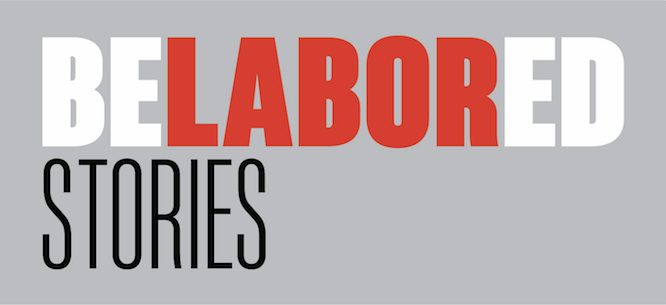Belabored Stories: Union Busting in a Disaster
Belabored Stories: Union Busting in a Disaster
Art handlers in New York City have filed an NLRB complaint alleging that their employer fired workers for organizing a union.

[contentblock id=coronavirus]
Belabored is a labor podcast hosted by Sarah Jaffe and Michelle Chen. Belabored Stories, a new feature, will present short accounts of what workers are facing during the coronavirus pandemic. Send us your stories at belabored@dissentmagazine.org
The toil of art handlers is the rough underbelly of the art world. Before a painting or sculpture is placed in a sunlit museum corridor, every piece is installed by a team of experienced laborers. They quietly vanish before the artwork is presented before the viewing public, without a trace of the sweat and calluses that made it possible.
Henry “David” Martinez’s former employer, Uovo Fine Art Storage, stores and transports art for galleries, museums, and private estates. Late last month, Martinez was told, due to the pandemic-induced economic lockdown that has shuttered galleries and museums across New York City, his boss was letting him go. Many of his coworkers were getting furloughed, however, not laid off. Martinez thinks he was sacked for trying to organize a union with the Teamsters six months ago.
Six of the workers who were dismissed were pro-union, he said, so to him, it was clear that it was a “disaster capitalism” move. The management used the lockdown as an “opportunity to get some cover, to make it look like it was for another reason [than] to get rid of us.”
The union drive had been aggressively opposed by the company. And the only reason to get rid of Martinez is that he was a troublemaker, he said. “I’m a fifty-eight-year-old worker. I’ve got more experience than anyone in the company; I’ve been doing this job for over thirty years. So I can only draw one conclusion.”
Martinez’s story is part of a National Labor Relations Board complaint recently filed by the Teamsters, alleging that Uovo retaliated against pro-union workers under the pretext of the COVID-19 crisis. The company claims, “Perceived support of labor unions was not a factor in our decision.”
Uovo, which provides storage and transport to world-class cultural institutions, presents itself as an ultra-modern boutique firm run by a “dedicated team of experts.” But Martinez thinks the business isn’t so different from any other warehouse company. Despite its clean-cut image, “from a worker’s perspective, it’s not true,” he said. “It’s just the same as everybody else. We didn’t have a retirement package. We had expensive health insurance with high deductibles, and it was especially prohibitive to use.” In terms of how the workers interacted with the management, he said, “we didn’t have any rights on the job,” including the ability to speak up on safety issues (art handling is a notoriously hazardous profession).
Martinez, who previously worked at a unionized art handling company, thought he was winning over a majority of the workers. But he believes that the anti-union consultancy that the company hired crushed his campaign. “They just isolated me from the workers, and they had a captive audience meeting,” he said, referring to a kind of anti-union propaganda session designed to deter people from organizing.
As the counter-programming continued, Martinez added, “it became a vote-counting thing. All they needed was to get a few people over, because we had a good majority. I thought we had this thing in the bag. And then they just literally wore people down. . . . [T]hey also really polarized the workplace.” Some coworkers, he added, feared for their jobs, or were simply frightened of unions. The anti-union campaigners “had one guy thinking that a union was a cult.”
Martinez credits his family background with giving him a cultural understanding of what unionization really means—something that many younger workers today lack, he said.
My father was the president of his union, he was a firefighter; my mother was a unionized worker. So, my first job I ever had in high school was a union job. And I’ve been around it for years. . . . I realize, these people have no experience at all. Don’t have [union] family members, and it’s sort of an alien thing to them . . . people [don’t] relate to it: [They say] “What is that, like, a socialist thing or something?” They don’t have a clue, you know?
The art handler workforce is also increasingly diverse, and organizing across race and class lines remains a challenge, especially since many younger workers treat art handling as a side hustle while they pursue creative endeavors. About half of the workers are “older Black guys and Spanish guys . . . people who aren’t artists [but] just needed a job,” Martinez said. The other half is full of “young kids that go to art school. And they now need a job, you know what I mean?”
Both sides of this workforce, he said, “have common economic interests. They have things that they need. But each different group kind of has a different perspective on it.” The younger workers, still ambitious about moving up in the art world, might be less demanding of their “day job.” But Martinez sees his career in a more sober light: “I think if you stay longer—like me . . . at some point, you’ve got to say to yourself: ‘Well, wait a minute. Things aren’t going to change. I’m just going to keep working. This is my life, you know, and I should have something to show for it.’”
Michelle Chen is a member of Dissent‘s editorial board and co-host of its Belabored podcast.






